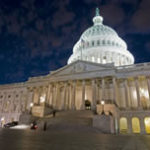
The Senate rejected dueling Democratic and Republican plans on May 24 for averting a July 1 doubling of interest rates on federal college loans for 7.4 million students, pushing back efforts to resolve the election-season showdown until next month.
In mostly party-line roll calls, senators voted 62-34 against the GOP package and 51-43 for the Democratic version, with each proposal falling short of the 60 votes needed for approval to avoid a filibuster.
Though both defeats were preordained, the twin votes gave lawmakers from each party a chance to show they favor easing students’ financial burdens—and potential grist for campaign ads accusing the other side of opposing the effort.
The Senate planned to leave town later in the day for a Memorial Day recess running through next week. Neither party wants to be accused of letting the interest rates grow at a time when voters are focused on coping in today’s rough-edged economy, giving each side an incentive eventually to strike a compromise.
A 2007 law gradually reduced interest rates on subsidized Stafford loans for low- and middle-income undergraduates to 3.4 percent. To save money, it mandated that rates return to 6.8 percent for new loans as of July 1.
President Barack Obama has made preventing a rate increase a priority and has appeared at colleges and on television talk shows to promote it.
Though some Republicans expressed early concerns that retaining the lower rate would fuel college tuition increases, likely GOP presidential candidate Mitt Romney endorsed freezing the rate and most GOP lawmakers have done the same.
Ten conservative GOP senators opposed their own party’s proposal, with some expressing concerns about budget costs and saying the loan market should set its own prices.
Both measures rejected May 24 would delay the interest rate increase for a year at a cost of $6 billion, but each side’s bill was paid for in a way the other couldn’t tolerate.
Democrats proposed raising Social Security and Medicare payroll taxes on high-earning owners of some privately held companies and professional practices, while Republicans would abolish an Obama preventive health program.
That idea drew a White House veto threat when Republicans used it to pay for their House-passed bill in April.
“The Republican proposal is paid for by stripping Americans of lifesaving preventive health care,” said Senate Majority Leader Harry Reid of Nevada, adding, “It would be a shame” to do that.
Senate Minority Leader Mitch McConnell of Kentucky argued that the Democratic plan showed they wanted “a scapegoat more than a solution,” because they knew Republicans would oppose its tax provision.
He also tried goading Obama, saying, “If the president’s got time to run around to late-night comedy shows and college campuses talking about this issue, then he can pick up the phone and work out a solution.”
After the votes, the two sides each tried taking the offensive.
White House spokesman Jay Carney said in a written statement that GOP senators “still have not proven that they’re serious about resolving this problem” and accused them of protecting a tax loophole for the rich at the expense of higher costs for students.
“It’s time to get this done so hardworking students get a fair shot at an affordable education,” Carney said.
House Speaker John Boehner, R-Ohio, said his chamber already had approved a reasonable bill extending low interest rates for students and said the dispute could be settled quickly if Democrats would bargain.
“If the president and Senate Democratic leaders prefer a different approach, then the onus is on them to offer a solution that can pass both chambers,” he said in a written statement.
The Education Department expects 7.4 million undergraduates to borrow subsidized Stafford loans next year averaging $4,226. Doubled interest rates would add around $1,000 in costs, which for the typical loan taking 12 years to repay would mean less than $10 monthly in added expense.
The Federal Reserve Bank of New York estimates that at least 37 million Americans owe $870 billion for outstanding student loans, a figure that is growing and that exceeds the money owed for credit cards or auto loans. Four in 10 people under age 40 owe money for a college loan, the bank says.
- Extron AV Switching, Streaming, and Control Systems Aid Higher Learning at Idaho’s First Medical School - June 1, 2021
- Extron XTP, Streaming, and Control Systems Empower Point Park University’s Varsity Esports Program - June 1, 2021
- Extron NAV Series Delivers AVoIP Throughout Allied Health Veterans Hall at UNC Wilmington - June 1, 2021
